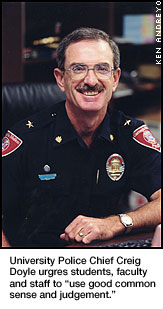|
|
||
|
|
|
University Police Making Efforts to Increase Campus Safety New Lighting, Information Network Among Recent Developments �  University Police is working to make the Carnegie Mellon campus safer for students, faculty and staff.
University Police is working to make the Carnegie Mellon campus safer for students, faculty and staff.
Creig Doyle, chief of University Police, said one of the biggest changes has been the addition of new lighting across campus. Light fixtures were added to the Cartwright Stairs, which descend to lower campus from the Purnell Center, the Devonshire Pathway leading from the Morewood Gardens parking lot to Fifth Avenue and on the press box side of Gesling Stadium. Michael Murphy, dean of student affairs, noted that various light fixtures on campus were on timers that hadn't been calibrated for the change of season. These timers have now been adjusted and the lights are coming on at dusk. In addition to the changes in lighting, Facilities Management Services and University Police are working to install three new pedestal-mounted emergency phones. The phones, which have blue lights to make them easily identifiable, will be installed on the Devonshire Pathway, on the west side of Hamburg Hall off Forbes Avenue and in the rear of Porter Hall near Frew Street. Three additional phones are in the planning stages—at Forbes and Beeler Street, in front of the Margaret Morrison Apartments, and at the Peace Garden between Hunt Library and the business school. All new emergency phones will be pedestal-mounted with lights. An information-sharing network has been established to notify the campus community of crimes and to publicize crime prevention techniques. "When we have a serious crime that involves a personal attack, injury or threat of injury to a student, we send out an email broadcast to all faculty, staff and students," said Doyle. Carnegie Mellon's police force is also teaming up with other colleges in the area to stay informed of local crime trends and problems on other campuses. The Area Campus Crime Information Sharing Network, comprising police departments from Carnegie Mellon, Carlow, Chatham, Duquesne, the University of Pittsburgh, UPMC and Children's Hospital, met for the first time last month. The goal of the group is to keep everyone in the network informed of serious incidents that occur on each campus. "We don't have walls around our campuses—everything just flows together. Our information needs to flow together, too," Doyle said. Information sharing will generally take the form of electronic communication. If a serious incident occurs at one school, the other schools in the network will be promptly notified by email. There will also be monthly meetings for representatives of each campus to discuss current crime trends. Doyle said the same crimes, like thefts and burglaries, are often perpetrated at multiple campuses by the same individuals. These monthly meetings will give officers the opportunity to talk about crimes, share photos of suspects and give advice on how to best resolve their situations. University Police has also made efforts to increase efficiency in the campus shuttle/Escort service. Student drivers have been replaced with full- and part-time drivers employed by University Police, and a student-run dispatching system was abandoned for a new cell phone-based, direct-to-driver method. Processes are also under way to make the shuttle/Escort service more convenient for passengers. All seven Escort stops will be marked with either a post-mounted reflective sign or a stencil on the sidewalk with the wording "Carnegie Mellon Escort." A flagging system is also under development to aid riders. Students and staff needing to travel late at night may also use SafeWalk, which operates between 11 p.m. and 3 a.m. when classes are in session. It is staffed by multiple student organizations. "SafeWalk is a wonderful program," Murphy said. "It's a student-run program that is operated seven days a week to provide a walking escort for students. Someone calls in and two students are dispatched and will walk the student wherever he or she is going." Doyle urges students, faculty and staff to be cautious. "You need to use good common sense and judgment," he said. One of the ways that members of the Carnegie Mellon community can learn to protect themselves and exercise good judgment is by taking a Rape Aggression Defense (RAD) class. The 12-hour class is given in two sessions and includes a lecture on personal awareness and crime prevention tips, such as walking in well-lit areas and never walking alone. The course also offers hands-on safety instruction that gives students the chance to participate in attack scenarios with a certified instructor. Both Doyle and Murphy stress that common sense is the most important tool people can use to avoid becoming victims of any kind of crime. "It is a safe campus and it's a relatively safe city," said Murphy, "but all cities have crime and campuses are a common place for criminals seeking to take advantage of the community of trust. In spite of increased caution and vigilance on the part of students, there are risks." What can you do to protect yourself? Be smart. Walk with someone else after dark or use the shuttle/Escort service or SafeWalk. Avoid poorly lit areas and learn basic self-defense techniques in a RAD class. Above all, keep University Police informed of any areas of concern so that the campus community can continue to work together to make Carnegie Mellon even safer. �
�
Top�
�
�
Susan Cribbs
|
|
This Issue's Headlines || Carnegie Mellon News Home || Carnegie Mellon Home |
||